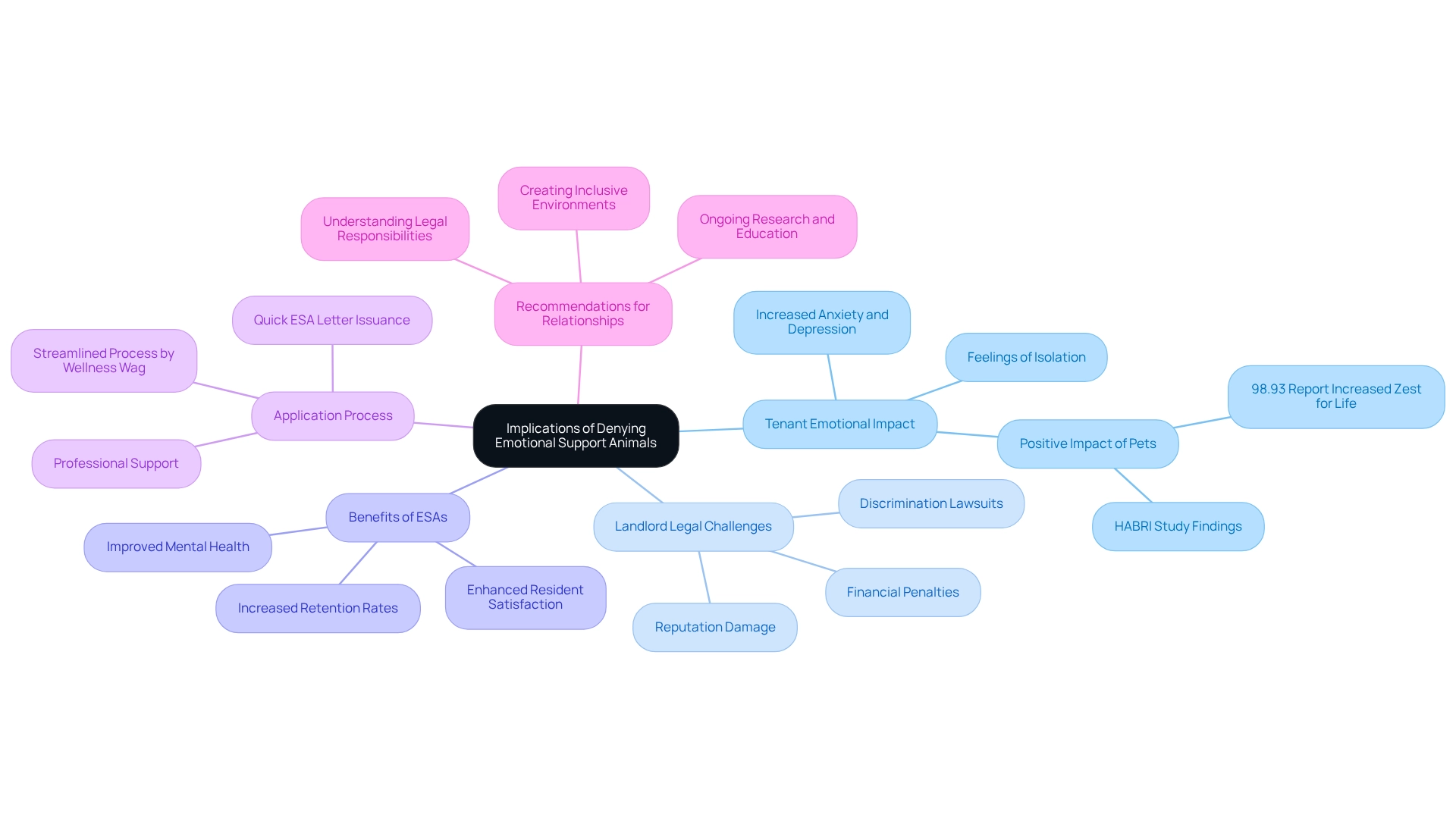

Can a Landlord Deny an Emotional Support Animal? Key Reasons Explained
by Lena Park
Last updated: June 27, 2025
Verified and Approved by:
Angela Morris,
MSW, LCSW
Fact Checked

Overview
For individuals facing mental health challenges, the journey can often feel overwhelming, especially when it comes to securing the support they need. Landlords can deny an emotional support animal under specific conditions, such as:
- If the animal poses a direct threat to health or safety
- If the animal causes significant property damage
- If a tenant fails to provide valid documentation from a licensed healthcare professional
It’s important to understand that landlords cannot deny ESAs based on breed, size, or weight. This is where the Fair Housing Act plays a crucial role, providing vital legal protections that ensure tenants’ rights are upheld and promoting the essential support for mental health. Remember, you are not alone in this process, and there are resources available to help you navigate these challenges.
Introduction
In a world that is increasingly recognizing the importance of mental health, emotional support animals (ESAs) have become essential companions for many individuals navigating psychological challenges.
The legal landscape surrounding ESAs is complex, influenced by regulations such as the Fair Housing Act and the Air Carrier Access Act, which safeguard the rights of tenants and facilitate travel for these beloved animals.
Yet, the delicate balance between tenant rights and landlord responsibilities raises significant questions about the circumstances under which ESAs might be denied.
As the need for these supportive companions grows, so too does the necessity for a clear understanding of the implications of denying such requests, both for the well-being of tenants and the legal obligations of landlords.
This article explores the legal framework governing ESAs, the conditions that may lead to their denial, and the broader implications of such decisions, highlighting the vital role these animals play in nurturing mental health and fostering inclusive living environments.
Legal Framework Governing Emotional Support Animals
The legal framework regulating emotional support animals is primarily established by the Fair Housing Act (FHA), which prohibits discrimination against individuals with disabilities. This law recognizes the struggles faced by those dealing with mental health challenges, acknowledging their need for companionship and support. Under the FHA, landlords are required to offer reasonable adjustments for tenants with emotional support animals, allowing them to live with their pets even in properties that have a ‘no pets’ policy. This legislation highlights the significant therapeutic benefits that emotional support animals provide, especially for individuals experiencing anxiety, depression, and PTSD. Research has shown that emotional support animals can enhance mental health outcomes, with many individuals reporting diminished symptoms and improved overall well-being. As noted by HABRI, “Dogs are recognized for alleviating stress and promoting physical activity,” further underscoring the positive effects these animals have on mental health.
In addition to the FHA, the Air Carrier Access Act (ACAA) facilitates the travel of ESAs with their owners, although recent regulatory changes have impacted some travel provisions. It is essential for renters to understand these legal safeguards to effectively champion their rights. At the same time, property owners must ensure adherence to federal regulations to prevent possible legal consequences related to whether a landlord can deny an emotional support animal. ESA owners also bear the responsibility for their animal’s behavior and any damages caused by their ESA, an important consideration for both tenants and landlords.
Understanding the differences between emotional support animals and service dogs is crucial, particularly regarding legal rights and access. While service dogs are trained to perform specific tasks for individuals with disabilities and have full public access rights under the Americans with Disabilities Act (ADA), emotional support animals offer companionship and emotional backing but do not possess the same access rights. Have you ever considered how many individuals benefit from these supportive relationships? Current statistics indicate that a notable percentage of tenants—31.0%—have reported interactions with assistance animals, highlighting their prevalence and significance in residential settings. Additionally, with more than 50,000 patients assisted by Wellness Wag, the importance of ESAs is further emphasized. This highlights the need for landlords to understand that can a landlord deny an emotional support animal is a critical question regarding the rights of renters under the FHA. As we look ahead to 2025, the number of residents with emotional support animals safeguarded under the FHA continues to rise, reinforcing the ongoing importance of these legal protections in fostering inclusive living environments.
Conditions for Denial of Emotional Support Animals by Landlords
Navigating the complexities of emotional support animals (ESAs) can be challenging for both renters and property owners. Many individuals struggling with mental health issues may feel overwhelmed by the prospect of finding a supportive companion. It’s important to recognize that ESAs play a vital role in enhancing emotional well-being, offering comfort and companionship in times of need.
However, under certain conditions, such as if the animal poses a direct threat to the health or safety of others, causes significant property damage, or if an individual fails to provide a valid ESA letter from a licensed healthcare professional, can a landlord deny an emotional support animal? For example, if an emotional support animal has a documented history of aggressive behavior, or if the property owner can demonstrate that the animal’s presence would impose an undue financial burden or fundamentally alter the nature of the housing operation, they may have valid grounds for denial.
It’s crucial to understand that property owners cannot deny emotional support animals based on breed, size, or weight restrictions, as these factors are not legally permissible grounds for rejection under the Fair Housing Act (FHA). A 2021 study even highlighted that individuals with secure bonds to their pets reported 25% lower anxiety levels, underscoring the significance of ESAs in enhancing mental health.
Understanding these circumstances is essential for both renters and property owners. Property owners must be educated on the laws that protect ESA owners from discrimination, ensuring compliance with regulations in their rental practices. Valid ESA letters must meet specific requirements, including being issued by a licensed healthcare professional, clearly stating the need for the animal as part of the individual’s emotional support strategy, and detailing the person’s mental health condition. This knowledge empowers renters to advocate for their rights while assisting property owners in managing the complexities of emotional support animal accommodations effectively.
Moreover, the rising demand for assistance dogs, especially for mental health issues such as PTSD, highlights the growing acknowledgment of the role that emotional support animals play in providing emotional aid. This trend further emphasizes the importance of understanding the legal protections surrounding ESAs and whether a landlord can deny an emotional support animal. Acquiring a valid ESA letter through a tailored consultation with a certified medical professional can simplify the approval process, ensuring that residents have the required documentation to support their requests for accommodation. By fostering understanding and compassion, we can create a more supportive environment for those who rely on emotional support animals.
Implications of Denying Emotional Support Animals
The question of whether a landlord can deny an emotional support animal can have significant consequences for both residents and landlords. For tenants, such denial often exacerbates existing mental health issues, leading to heightened anxiety, depression, and feelings of isolation. This emotional distress can significantly impact their overall well-being and productivity, particularly in high-stress environments. Have you ever felt overwhelmed by your circumstances? Research shows that 98.93% of individuals reported a heightened enthusiasm for life after obtaining a pet, highlighting the essential role of emotional support animals in mental health management. The HABRI study further supports this, stating that the pet’s companionship and presence eased their mental health symptoms.
From a property owner’s perspective, the issue of can a landlord deny an emotional support animal improperly can lead to serious legal challenges, including lawsuits for discrimination under the Fair Housing Act (FHA). Landlords may face legal actions that not only lead to substantial financial penalties but also tarnish their reputation. It’s important to recognize that particular instances have demonstrated that property owners who can a landlord deny an emotional support animal without valid reasoning have faced successful discrimination lawsuits. This underscores the necessity of comprehending legal responsibilities. Furthermore, cultivating a nurturing atmosphere for residents with emotional support animals can improve resident satisfaction and retention, ultimately benefiting property owners over time.
The experience of individuals applying for emotional support animals through Wellness Wag illustrates the importance of a streamlined process. As Linda S. noted, “Applying for an ESA through Wellness Wag was the best decision I made. It was an effortless process and the team was very professional.” This positive customer experience emphasizes how a supportive application process can alleviate the stress associated with obtaining an ESA. By ensuring a smooth application process, property owners can mitigate potential legal issues and foster a more inclusive environment for tenants.
Understanding the implications of whether can a landlord deny an emotional support animal is essential for maintaining healthy landlord-tenant relationships. Ongoing investigation into the advantages of emotional support animals and service animals is essential, as it can guide improved practices and policies that address mental health requirements while ensuring adherence to legal standards. By recognizing the importance of ESAs, landlords can create a more inclusive and supportive living environment, which is beneficial for all parties involved.

Conclusion
The legal framework surrounding emotional support animals (ESAs) plays a crucial role in protecting the rights of tenants while also considering the responsibilities of landlords. The Fair Housing Act and the Air Carrier Access Act offer vital protections that enable individuals facing mental health challenges to experience the comforting companionship of ESAs. Yet, it is equally important to understand the specific circumstances under which landlords may deny these requests. Legitimate grounds for denial include:
- Threats to health or safety
- The lack of valid ESA documentation
But landlords must tread carefully to avoid discrimination based on breed or size.
Denying an ESA can have profound implications for tenants, often exacerbating mental health struggles and deepening feelings of isolation. For landlords, non-compliance with legal obligations can lead to serious consequences, including discrimination lawsuits and harm to their reputation. Therefore, creating an inclusive environment that acknowledges the significance of ESAs not only enhances tenant satisfaction but also shields landlords from potential legal challenges.
As the demand for emotional support animals continues to rise, it is vital for both tenants and landlords to be informed about their rights and responsibilities. By fostering understanding and compliance with ESA regulations, a nurturing and supportive living environment can be cultivated. This approach ultimately benefits the mental health of tenants and nurtures a positive relationship between landlords and tenants, reinforcing the idea that everyone deserves support and compassion in their journey.
Frequently Asked Questions
What legal framework regulates emotional support animals (ESAs)?
The legal framework for emotional support animals is primarily established by the Fair Housing Act (FHA), which prohibits discrimination against individuals with disabilities and requires landlords to make reasonable adjustments for tenants with ESAs.
What does the Fair Housing Act (FHA) recognize regarding emotional support animals?
The FHA recognizes the struggles faced by individuals with mental health challenges and acknowledges their need for companionship and support from emotional support animals.
Can landlords deny tenants with emotional support animals?
Under the FHA, landlords are required to allow tenants with emotional support animals to live with their pets, even in properties that have a ‘no pets’ policy, unless specific exceptions apply.
What therapeutic benefits do emotional support animals provide?
Emotional support animals provide significant therapeutic benefits, particularly for individuals experiencing anxiety, depression, and PTSD, often leading to diminished symptoms and improved overall well-being.
How does the Air Carrier Access Act (ACAA) relate to emotional support animals?
The Air Carrier Access Act (ACAA) facilitates the travel of emotional support animals with their owners, although recent regulatory changes have affected some travel provisions.
What responsibilities do ESA owners have?
ESA owners are responsible for their animal’s behavior and any damages caused by their emotional support animal.
How do emotional support animals differ from service dogs in terms of legal rights?
Emotional support animals provide companionship and emotional backing but do not have the same public access rights as service dogs, which are trained to perform specific tasks for individuals with disabilities.
What percentage of tenants report interactions with assistance animals?
Current statistics indicate that 31.0% of tenants have reported interactions with assistance animals, highlighting their prevalence and significance in residential settings.
What is the trend regarding the number of residents with emotional support animals?
The number of residents with emotional support animals safeguarded under the FHA is expected to continue rising, reinforcing the importance of legal protections for these animals in fostering inclusive living environments.
Certify Your Emotional Support Animal Today

Why You Can Rely on Us?
At Wellness Wag, we believe your pet deserves care rooted in both science and compassion. Each article is carefully researched, written in clear language for pet owners, and then reviewed by qualified professionals to ensure the information is evidence-based, current, and practical for real-life care. Our goal is to help you feel confident in making informed decisions about your pet’s health and well-being.
Reviewed by
Angela Morris, MSW, LCSW
Angela is a licensed clinical social worker with 20 years of experience in patient advocacy and community mental health. She has assisted numerous clients with ESA evaluations and brings a deep understanding of disability accommodations, ensuring that all information is accurate, supportive, and practical.

Written by :
Lena Park
Last Updated :
June 27, 2025












